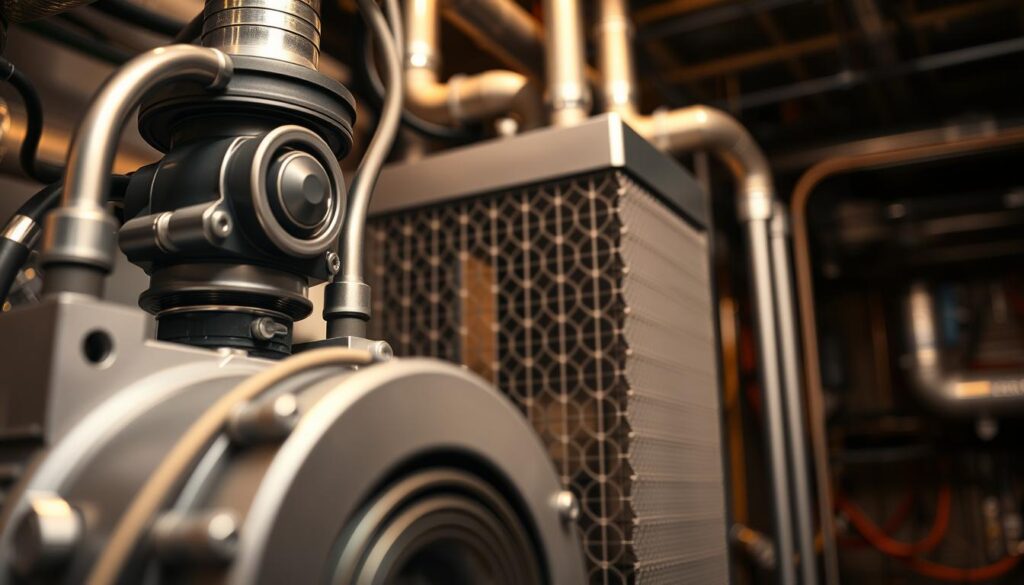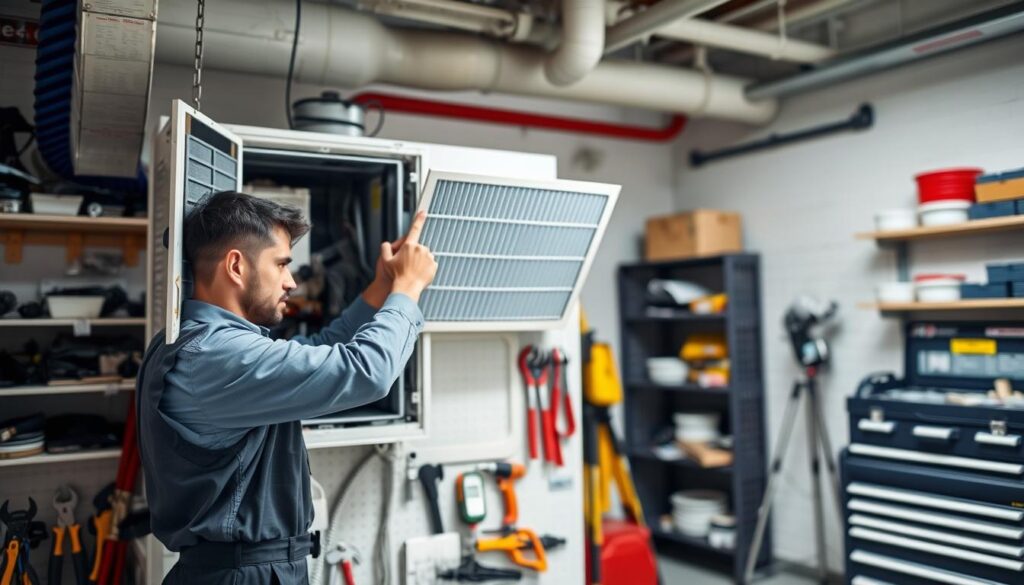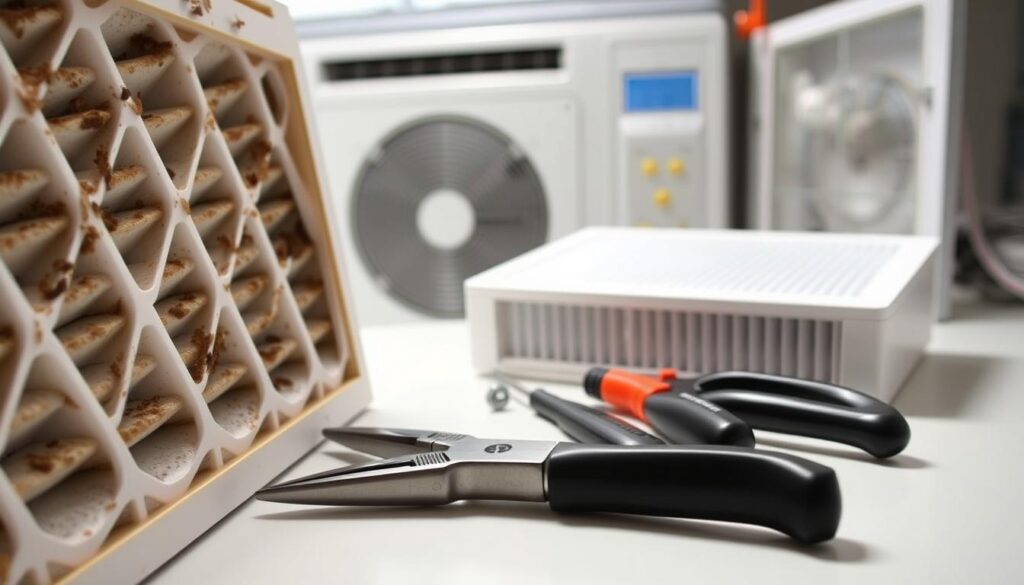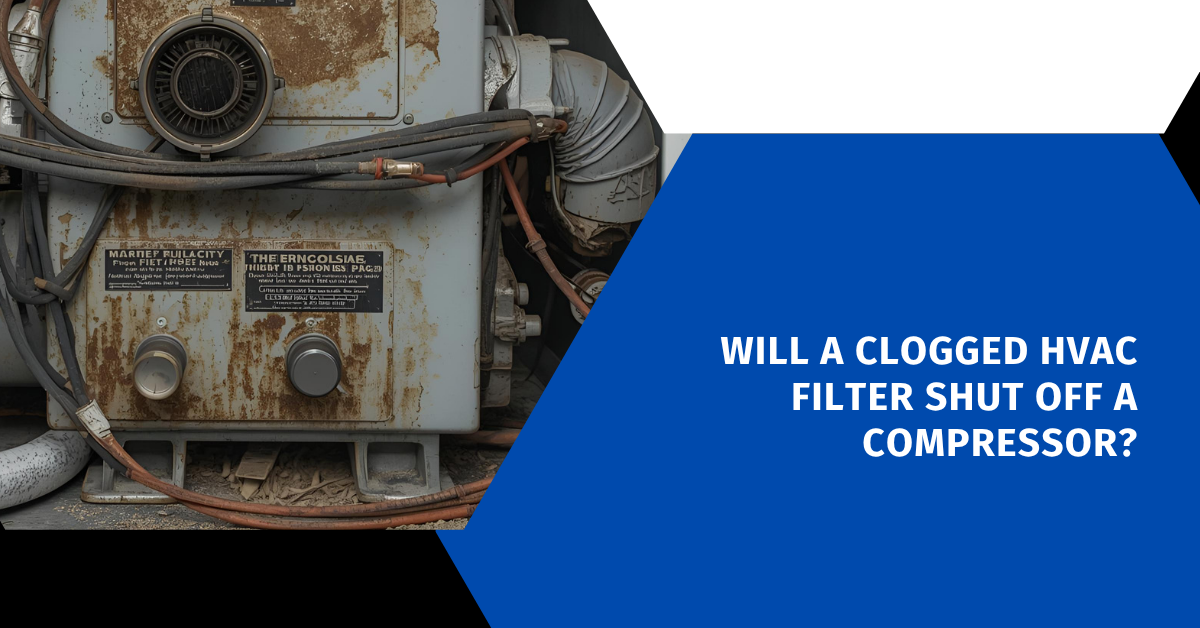Affiliate Disclosure
HVAC Guide Guys is a participant in the Amazon Services LLC Associates Program, an affiliate advertising program designed to provide a means for sites to earn advertising fees by advertising and linking to Amazon.
Will a Clogged HVAC Filter Shut Off a Compressor? Ever thought about what happens if you ignore your HVAC air filter? Could a clogged filter really shut down your air conditioning? Many homeowners don’t think about this, but knowing the risks could save you from costly repairs.

Your HVAC system needs clean, free airflow to work right. A clogged air filter might not stop your AC right away. But, it can start a chain of problems that harm your system’s performance and life.
Today’s HVAC systems have safety features to avoid big failures. But, blocked filters can put a lot of stress on your compressor. This could lead to your system breaking down too soon.
Key Takeaways
- Clogged filters create airflow restrictions in HVAC systems
- Restricted airflow increases system stress and energy consumption
- Regular filter maintenance prevents possible compressor damage
- Safety mechanisms protect against complete system failure
- Professional inspections can spot early warning signs
Table of Contents
Understanding the Relationship Between Air Filters and Compressors
Your HVAC system needs all parts to work well together. Air filters are key in keeping your compressor safe and your system running smoothly.
How Air Filters Protect Your HVAC System
HVAC compressor protection starts with the air filter. It catches harmful particles first. The filter’s main job is to stop:
- Dust and debris
- Pollen
- Pet dander
- Microscopic airborne contaminants
The Critical Role of Proper Airflow
Good airflow is vital for your HVAC system’s efficiency. A clean air filter helps air flow smoothly. This prevents extra stress on the compressor.
A dirty air filter can harm the compressor. It might make your system less efficient, use more energy, and even damage parts over time.
Impact on System Performance
When air filters get clogged, your system works harder. This can hurt the compressor’s performance. It might even cause your system to fail early.
| Filter Condition | System Performance | Energy Efficiency |
|---|---|---|
| Clean Filter | Optimal | High |
| Partially Clogged Filter | Reduced | Medium |
| Severely Clogged Filter | Poor | Low |
Regular maintenance and timely filter replacement are key to protecting your HVAC system’s critical components and ensuring long-term performance.
The Chain Reaction: From Clogged Filter to System Shutdown
Your HVAC system is like a delicate ecosystem. When your air filter gets clogged, it starts a chain of events. This can lead to your system shutting down completely.
The first issue is when airflow gets restricted. This happens when dirt and debris build up in your filter. It puts a lot of stress on your HVAC system.
- Reduced air circulation increases internal system temperature
- Evaporator coil begins to freeze due to insufficient airflow
- Compressor experiences extreme operational strain
Each step in this chain makes things worse. The frozen evaporator coil blocks more air. This makes your system work even harder.
“A clogged filter is like a heart struggling to pump blood through narrowed arteries – eventually, something must give.”
Without fixing it, things get worse fast. Your compressor works harder, making too much heat. This can damage important parts of your system.
Key takeaway: Regular filter maintenance isn’t just recommended – it’s essential for preventing catastrophic system shutdown.
Explore Our HVAC Shop
Looking for top-rated HVAC tools, parts, and accessories? Visit our shop and find the perfect solution for your needs.
Visit the ShopWill a Clogged HVAC Filter Shut Off a Compressor?
Your HVAC system has smart safety features to avoid big damage. When a clogged air filter causes trouble, these safety measures spring into action. They protect your expensive equipment.
Direct vs. Indirect System Effects
A clogged filter doesn’t right away turn off your compressor. Ac compressor overheating from clogged filter happens through a series of stress points. These points slowly lower system performance.
- Restricted airflow increases internal system pressure
- Reduced cooling efficiency raises component temperatures
- Prolonged stress triggers protective shutdown mechanisms
Safety Mechanisms in Action
HVAC systems have advanced safety features. The hvac system high pressure cutoff is a key safety feature. It watches and acts on conditions that could harm the system.
| Safety Mechanism | Activation Trigger | System Response |
|---|---|---|
| High Pressure Cutoff | Excessive Refrigerant Pressure | Compressor Shutdown |
| Temperature Limit Switch | Overheating Components | Emergency System Stop |
Temperature and Pressure Warning Signs
Your system always checks its internal conditions. If pressure or temperature gets too high, it shuts down automatically. This prevents mechanical failure.
“Prevention is always more cost-effective than repair” – HVAC Maintenance Professional
Common Signs of a Clogged Air Filter
Spotting a clogged air filter early can save your HVAC system from big problems. A dirty air filter can really hurt your compressor’s performance. If ignored, it might even cause your AC to shut down completely.
Your HVAC system sends out warning signs when the air filter gets dirty. Keep an eye out for these important signs:
- Reduced Airflow: If the air coming from vents is weak, it means the filter is clogged and blocking air flow.
- Increased Energy Bills: Your system works harder, using more electricity to keep the temperature right.
- Uneven Room Temperatures: Some rooms might feel warmer or cooler than others.
- Visible Dust Buildup: If you see a lot of dust around vents and return air registers, it’s a sign of a dirty filter.
A clogged air filter can really risk shutting down your AC. When air flow is blocked, your system’s parts face too much stress.
| Filter Condition | System Performance Impact |
|---|---|
| Clean Filter | Optimal Airflow, Efficient Cooling |
| Moderately Dirty | Reduced Efficiency, Higher Energy Use |
| Severely Clogged | Potential System Shutdown, Compressor Risk |
Regular checks can help you spot filter problems early. Look at your filter every month and change it every 90 days. If you have pets or live in a dusty area, you might need to change it more often.
How Restricted Airflow Damages Your Compressor
Your HVAC system needs good airflow to work right. Clogged air filters hurt the whole system, and the compressor gets hit hard. AC compressor overheating from a clogged filter is a big problem. It can cause expensive fixes and make your system fail early.
When airflow is blocked, your HVAC system’s parts start to have problems. The compressor works too hard to keep things cool. This makes it hotter inside and puts more stress on it.
Refrigerant Floodback Issues
Clogged filters can lead to bad refrigerant floodback. When liquid refrigerant goes back to the compressor, it can really harm it:
- Lubricant gets washed away from important bearings
- Potential damage to rotor and stator windings
- Higher chance of electrical short circuits
Compressor Overheating Scenarios
When airflow is cut off, your compressor’s protection kicks in. Too much heat can cause:
- The system to shut down because of heat
- Parts to wear out faster
- The system’s efficiency to go down
Long-term Component Stress
Running your HVAC system when it’s not right can weaken it over time. Keeping your filters clean is key to avoiding expensive compressor damage and unexpected breakdowns.
Explore Our HVAC Shop
Looking for top-rated HVAC tools, parts, and accessories? Visit our shop and find the perfect solution for your needs.
Visit the ShopPrevention and Maintenance Guidelines

To keep your HVAC system running well, you need to take care of it regularly. Cleaning your air filters is key to avoiding problems with airflow. This helps your system work better and last longer.
Here are the main steps for keeping your HVAC in top shape:
- Check your air filter every month for dirt and dust
- Change filters every 90 days or sooner if they get dirty
- Change them more often if you have:
- Pets at home
- People with allergies
- A lot of dust around
Getting help from a pro is very important for your system’s health. A skilled HVAC technician can do more than just change filters. They can find and fix problems early, saving you money on big repairs.
When picking new filters, remember to:
- Choose the right size for your HVAC unit
- Look for a MERV rating that fits your home’s needs
- Follow the manufacturer’s advice
Following these tips will help prevent sudden breakdowns and make your HVAC last longer.
Understanding HVAC Safety Features and Protection Mechanisms
Modern HVAC systems have advanced safety features. These features protect your investment and ensure they work well. They prevent system failures and costly damage.
Your HVAC system has many safety features. The high-pressure cutoff is a key safety technology in modern cooling systems.
High-Pressure Cutoff Systems
High-pressure cutoff systems protect your air conditioning unit. They watch refrigerant pressure and turn off the system if it gets too high. They do several important things:
- Preventing refrigerant line ruptures
- Protecting the compressor from dangerous pressure
- Detecting abnormal system conditions quickly
Temperature Monitoring Devices
Temperature sensors are vital for your HVAC system’s safety. They keep an eye on internal temperatures and act fast if it gets too hot.
Emergency Shutdown Protocols
Emergency shutdown protocols kick in when big problems happen. They make sure your system stops safely and quickly to avoid major failures.
Safety isn’t an option—it’s a fundamental requirement for reliable HVAC performance.
Explore Our HVAC Shop
Looking for top-rated HVAC tools, parts, and accessories? Visit our shop and find the perfect solution for your needs.
Visit the ShopFilter Replacement Best Practices and Schedules
Keeping your HVAC system’s air filter clean is key to avoiding shutdowns. Regularly replacing the filter helps prevent system failures. This keeps your home comfortable and safe.

Choosing the right filter is important. You need to think about your specific needs. Here are some key points to consider:
- Recommended filter replacement frequency
- Filter type and MERV rating
- Household air quality considerations
- System-specific maintenance requirements
How often you need to replace your filter depends on several factors. Homes with pets, high dust levels, or poor air quality need more frequent changes.
| Household Type | Recommended Filter Replacement |
|---|---|
| Single-person home, no pets | Every 6-12 months |
| Family home with pets | Every 3-6 months |
| Homes with allergies/respiratory issues | Every 1-3 months |
“A clean air filter is your first line of defense against HVAC system breakdown.” – HVAC Maintenance Experts
Here’s how to replace your filter:
- Turn off your HVAC system
- Locate the filter compartment
- Remove the old filter
- Check the arrow indicating airflow direction
- Insert the new filter correctly
- Restart your system
Regular filter maintenance saves you from expensive repairs and shutdowns. Keep your HVAC system running smoothly by replacing filters regularly.
Conclusion
Knowing how a clogged HVAC filter can shut off a compressor is key to keeping your home cool. A study showed that ignoring maintenance can destroy compressors in a few years. This leads to big financial losses.
Your air conditioner’s safety features are vital to avoid big system failures. Regular filter changes and maintenance keep your HVAC safe from airflow problems. A clogged filter can really harm your equipment’s life.
Preventive care is your strongest defense. Regular checks, timely filter changes, and professional maintenance can prevent costly repairs. Your HVAC is a big investment. Simple steps like checking airflow and replacing filters can make it last longer.
Take action now. Get a professional to check your HVAC, learn about its needs, and stick to a filter replacement plan. Being proactive means better performance, energy savings, and peace of mind for years.

